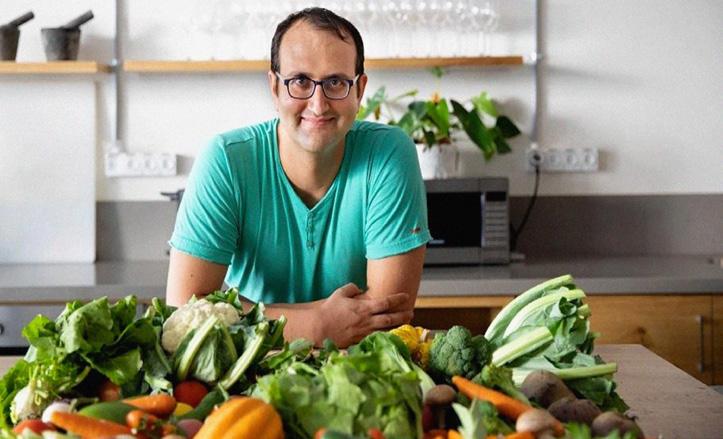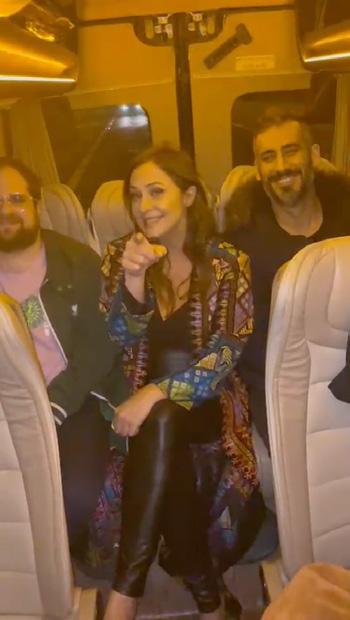
7 minute read
Welcome
In January we launched TAMUZ with our first winter issue. Thank you for all your comments, good words, and for joining the programs associated with the magazine, such as the exclusive meetup with singer/songwriter Elai Botner and our climate change discussion with Jakir Manela, CEO of Hazon and Pearlstone, and Morielle Lotan, founder and CEO at MILE Ventures and founder at Climate 180 Forum. With Passover around the corner, the idea of freedom is in the air. Freedom can mean a lot of things for a lot of people. It is both a social movement toward peace as well as a personal achievement. It is the long journey that the people of Israel took to get to the promised land, as well as women “breaking the glass ceiling” and achieving success and recognition for their work on a par with men. There are many people who had to break glass ceilings to get to where they are today. We decided to shine a light on some of them in this issue. People in our community are breaking their own glass ceilings every day, in many paths of life, by challenging the status quo of daily life. It could be seen in our swim instructors at the Marlene Meyerson JCC Manhattan who continued to provide for the community during the pandemic. It was the nurse that stayed with a patient to hold their hand when they couldn’t
have family near. It is the ongoing need to provide the space for a friend to be themselves. It is our ability to hold space for and accept our mental health struggles, and reach out for help when needed. This season, we hope that we can all think about our own individual glass ceilings. What is holding us back, be it societally or personally? How can we support ourselves and others to break through that ceiling to reach greater heights of freedom? We must recognize, too, that these efforts are constant and generational, always moving and changing, and not just a one- time push. In March, the JCC launched a Re-Connect Campaign, a reminder of how important gathering together for activities, discussion, and celebrations can be in helping each of us to reenergize, re-bound, re-strengthen, and re-learn after so many months of pandemic-related isolation. We hope you will join us soon for some of our in-person events. For some it is easy, for some it is hard, but we are here for you. Together we will stand and bring our lives back to where they were. We will re-connect, be stronger, and break through the new glass ceiling before us. Have a great spring, The TAMUZ Team
Advertisement

In January, The David H. Sonabend Center for Israel launched the virtual magazine TAMUZ, with tremendous success. TAMUZ, which takes its name from the Hebrew month that usually falls around July, is the best representation of Israel, and of Israelis; it’s hot and warm; it’s edgy, but also soothing. Just like Israel. And just like Israel, it’s a blend of cultures, tastes, colors, smells, and languages.

Sheila Lambert, David H. Sonabend, and Erica Frederick in Israel, 1995 This second issue, with the theme “breaking the glass ceiling,” provides an opportunity for us to share the story of our family, the Sonabends, who broke many glass ceilings for the existence of Israel. We hope the story of our parents and grandparents will light the spark of Israel within your hearts, just as it did for us. Ten years ago, we dedicated The David H. Sonabend Center for Israel at the Marlene Meyerson JCC Manhattan in memory of our beloved father, whose passion for Israel infused our family life. The Center has memorialized him in the best way possible by promoting dialogue, education, and commitment within the Jewish and Israeli communities, just as our father made it his life’s mission to do. Hilda and Abraham (Abe) Sonabend, our grandparents, first went to Israel in 1936, when it was still Palestine. They went to help plant trees on the kibbutz Ma’ale Hahamisha that Abe’s cousin, Menachem Katz, and three other men from Poland were building. Kibbutz Ma’ale Hahamisha, located on the outskirts of Jerusalem, is still thriving today.

Gitel Sonabend
Abe’s mother, Gitel Sonabend, our great grandmother, emigrated to Israel after World War II with the body of her husband, to be buried. Gitel settled in B’nai Brak, where she founded a charity to provide doweries for poor Orthodox women. Abe was a major contributor to this endeavor. Only after Gitel’s death, when an article was written about her, did we realize how many hundreds of young girls she had helped. Dr. David H. Sonabend was Abe and Hilda’s oldest son. He and his wife Roslyn took their first trip to Israel in 1954, when Roslyn was pregnant with our brother Andrew. They toured the country and spent time with Menachem on the kibbutz and with Grandma Gitel. Gitel only spoke Yiddish, as she believed Hebrew was a holy language; David, who was fluent in Yiddish, was able to communicate with her and together they taught Roslyn the language. Gitel lived to be 98 years old and, before she passed away, there were five generations of Sonabends, including her first great-great grandson. We were Abe and Hilda’s first grandchildren, and their delight in having twin girls was unmatched. They traveled with us in the U.S., and when we were 16 years old, took us on a grand tour of Europe, which included a month in Israel. The year was 1963. During this time, we could only look at the Old City from outside and guards were posted everywhere. We spent several days at Ma’ale HaHamisha, where Menachem took us to the top of a hill where we could see Jordan right below, barren, and dry. When we returned years later, after the Six Day War, Menachem took us to that same hill, where the land in front of us was now Israel. It was green as far as the eye could see, a testament to the industriousness of Israelis. We swam in the huge pool in Herzliya, had mud baths at Ein Gedi, and visited Jerusalem, Tel Aviv, Haifa, Akko, Tiberias, Golan Heights, Safed, and more. Our father David was an incredibly learned Jew; he loved Torah study and participated in weekly discussions. He was a leader of his synagogue and an active fundraiser to

help it thrive. His greatest contribution was to the growth of the JCC movement. He was chairman of the Beach Y in Long Beach, New York, and presided over its merger with the JCC in neighboring Oceanside. The Beach Y building was named by our family in his memory. David was a much beloved pediatrician in Long Beach and nearby towns. He made three dozen house calls a day during flu season, answered his phone in the middle of the night for emergencies, and was the doctor for the high school football team. Years after he retired, patients would call him for advice, and many were inspired by him to become physicians. And so, two of David’s greatest passions were Israel and the JCC. What could be more fitting than memorializing him by naming the David H. Sonabend Center for Israel at the Marlene Meyerson JCC Manhattan? Each day at The David H. Sonabend Center has been so meaningful for us, as we have experienced its growth over the past decade. We have been privileged to get to know our wonderful partners on the Center’s Advisory Council and the professionals who have carried out the mission. The Center for Israel has given us balanced perspectives on the issues that Israel faces and the ability to have intelligent, informative, and civil dialogue surrounding such issues. It has helped us to welcome and craft meaningful programming for Israelis living in New York City as well as enabled us to understand and be more sensitive to Israeli perspectives on American Jewish life. It has increased our knowledge of politics, arts, and culture, enriching the work of many of the other centers at the JCC. We know our father is smiling from above. With deepest gratitude,
Sheila Lambert Chair, Development Committee Marlene Meyerson JCC Manhattan Erica Frederick Chair, Advisory Council The David H. Sonabend Center for Israel









